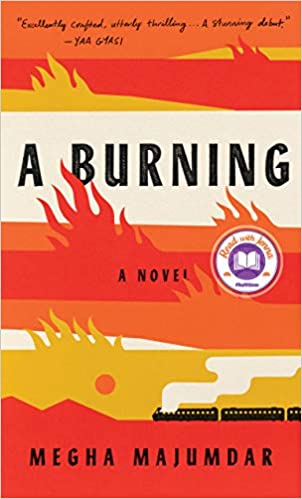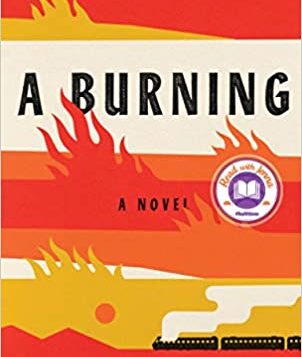 A BURNING
A BURNING
by Megha Majumbdar
Knopf. 288 pages, $25.95
THIS DEBUT NOVEL, Megha Majumbdar’s A Burning, is a moving indictment of nearly all of modern India’s institutions, from politics and the police to the educational system and even Bollywood. Each chapter is told from the perspective of one of the three main characters: Jivan, a young woman arrested for her alleged involvement in a train bombing; Lovely, a hijra (transgender person) trying to make it as an actress, tutored in English by Jivan; and PT Sir, a teacher at Jivan’s old school who gets involved in politics and proves instrumental in Jivan’s fate. Together, these voices demonstrate the ugliness of a beautiful country and the challenges that face those who dare to question its rules.
Jivan lives in poverty in an unnamed city with her parents, silently seething against the injustices her family has suffered. The government forcibly evicted them from a shantytown under commercial development. Medical care for her father’s fractured back is nearly nonexistent. She comments on Facebook posts about the attack on a train: “Policemen paid by the government watched and did nothing while this innocent woman lost everything.” This remark leads to her arrest on suspicion of collaborating with the terrorists and her terrible ordeal. The government turns nearly every aspect of her life against her: a Facebook friend she chats with is accused of being one of the terrorists; her chats “prove” that she worked to provide him with information and material for the attack. Other chapters relate Lovely’s journey. A hijra, or male living as a woman, she scratches out a living blessing babies, a service for which she is grudgingly paid. She takes acting lessons and has photos made for auditions, but nothing comes of these efforts. Asked by Jivan’s mother to speak at her trial, Lovely proudly defends her English teacher. When her self-made audition video goes viral, her acting career takes off, but her new friends demand that she stop defending Jivan. With great reluctance, she agrees, eventually forgetting her friend. PT Sir’s story shows just how easily the system can corrupt someone. The PE teacher at Jivan’s school who was called upon to fix the sound system at assemblies gets involved with a rising political party after adjusting the sound at an outdoor rally. Soon after that, at the party’s request, he accuses supposedly “immoral” people of crimes, justifying his actions as he rises in comfort and power. Eventually he becomes minister of education and seals Jivan’s fate. Early on, hearing about her case in the news, he remembers the slight interest he took in her when she was a student and how “ungrateful” she was before suddenly disappearing. His story is chilling but feels all too common. The novel also includes a chapter from a soldier who cleared out Jivan’s shantytown and one from the real estate agent who sold her family their shack, which was not the same one they looked at and bought. They show no recognition of the lives they have ruined. In clear, easy prose, and with an engaging plot, A Burning dramatizes the many injustices suffered by so many Indian people who are too poor to afford reputable doctors, attorneys, or agents, and the connections and moral compromises needed to get ahead. In depicting the inequalities in Indian society, the book resembles Arundhati Roy’s novels, but also depicts the power of social media for good and ill.
Charles Green, a frequent G&LR contributor, is a writer based in Annapolis, Maryland.





